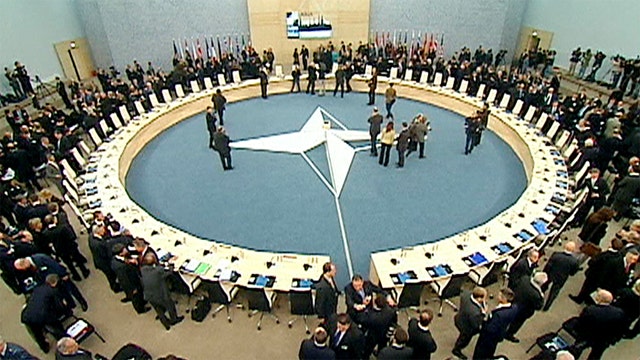Is NATO still relevant against Russia, ISIS?
Luke Coffey and Frank Gaffney on whether the Western organization can handle current overseas conflicts
NATO might be losing its focus as it tries to strengthen its roles with both the crisis in Ukraine and rise of the terrorist group ISIS in the Middle East, according to foreign policy analysts.
Luke Coffey and Frank Gaffney told FoxNews.com the military alliance is slowly forgetting its “principle mission” in protecting the defense of its member states.
Coffey is the Margaret Thatcher Fellow at the Heritage Foundation and Gaffney serves as the founder and president for the national security think tank, Center for Security Policy.
There is a growing call from critics that the organization doesn’t have a role in fighting ISIS, now called Islamic State.
“I think NATO needs to get back to some of its roots, back to the basics,” said Coffey. “ISIS, without a doubt, poses a threat to the members inside NATO, but I think as an alliance this is not a challenge NATO should take on.”
He instead proposes the U.S. lead a “coalition of the willing" that could include NATO members, but should not fall under their jurisdiction “because as we saw in Libya in 2011, when you get 28 members around a table … it slows down the process and with this fight against ISIS you’re going to need quick and rapid decision-making .”
[pullquote]
Gaffney sees NATO as “being a pale shadow of itself” as result of reduction in defense spending by the U.S. and its allies. “[Before] we go into Iraq or Syria with NATO, I think we best should think about rebuilding NATO’s capabilities to protect their own territory.”
Only four of NATO's 28 member states, including the U.S., have met the pledge to meet or exceed 2 percent of their country's GDP on military spending.
NATO members are currently debating how to possibly boost their support for Ukraine's military to fight pro-Russian rebels.
Coffey proposes a limited role in NATO helping Kiev against Moscow, but “unfortunately for Ukraine, they are not a member right now.”
Gaffney, however, a former Reagan defense official, warns that Russian President Vladimir Putin is “looking to get even” with the West and NATO for their expansion into the former Soviet Union’s sphere of influence.

